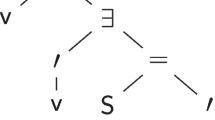Similar content being viewed by others
Notes
However, if the names are non-rigid designators, then the consequent may be false even if the antecedent is true (see Kripke 1980, p. 3).
According to the perdurance theory of persistence, entities persist by having distinct temporal parts at distinct times (see Lewis 1986, p. 202). The thesis of unrestricted mereological composition says that whenever there are some things, no matter how disparate and unrelated, there is something composed of just those things (again see Lewis 1986, p. 211).
Taken in the epistemological way, the attorney should be understood as saying: “But how do you know that you saw the accused person in the location if you only saw (or thought you saw) his face?” In this epistemological sense, the objection seems pretty fair because the experiential content of the observation does not rule out that what was actually seen was, for example, just a photograph of the face of the accused, held up by the real criminal in front of the key hole.
I would deny, though, that you see an entity x directly, or non-derivatively, purely on the basis of seeing a proper part of x. Also, it seems to me that if one adds “the whole of” to “seeing x” then one signals that the subject sees x directly, or at least every exterior part—if not every interior part—of x directly. So if that was what Aranyosi said in court, then I believe he said something false.
Let me say the obvious: we can, and certainly do, introduce names for proper parts of things: “Cerebellum”, “Mount Everest”, “Alaska”, “the Far Side of the Moon”, etc. Also, there are names purporting to name, and predicates satisfy-able by, spatially scattered entities: “the Andromeda Galaxy”, “the Solar System”, “USA”, “university”, “family”, “species”, “atom”, etc.
Presumably, “Venus” was also introduced with the help of an unsatisfied sortal predicate (“is a god”). But here I see no relevant reason not to take the name to refer to the whole planet, i.e. to the whole four-dimensional space-time worm [given assumption (a)], if we take the name to refer at all.
No doubt, we in the 21st century may simply decide to stipulate that “Hesperus” and “Phosphorus” refer to Venus. But the question is whether such a decision is consonant with the linguistic behaviour of the ancient Greeks (see Linsky 1959).
I thank Lena Wahlberg for helpful comments on an earlier draft of this paper.
References
Aranyosi I (2009) Hesperus is phosphorus, indeed. Axiomathes 19(2):223–224
Hansson Wahlberg T (2009) Is phosphorus hesperus? Axiomathes 19(1):101–102
Kripke S (1980) Naming and necessity. Harvard University Press, Cambridge
Lewis D (1986) On the plurality of worlds. Blackwell, Oxford
Linsky L (1959) Hesperus and phosphorus. Philos Rev 68(4):515–518
Thomasson A (2007) Ordinary objects. Oxford University Press, Oxford
Author information
Authors and Affiliations
Corresponding author
Rights and permissions
About this article
Cite this article
Hansson Wahlberg, T. Names Introduced with the Help of Unsatisfied Sortal Predicates: Reply to Aranyosi. Axiomathes 20, 511–514 (2010). https://doi.org/10.1007/s10516-009-9072-5
Received:
Accepted:
Published:
Issue Date:
DOI: https://doi.org/10.1007/s10516-009-9072-5



